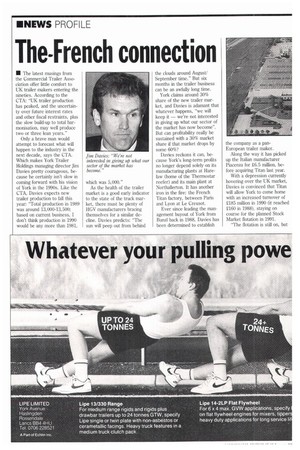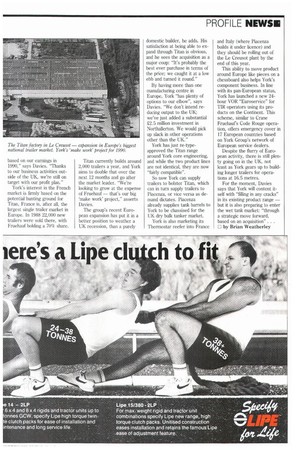Thefrench connection
Page 22

Page 23

If you've noticed an error in this article please click here to report it so we can fix it.
IN The latest musings from the Commercial Trailer Association offer little comfort to UK trailer makers entering the nineties. According to the CIA: "UK trailer production has peaked, and the uncertainty over future interest rates and other fiscal restraints, plus the slow build-up to total harmonisation, may well produce two or three lean years."
Only a brave man would attempt to forecast what will happen to the industry in the next decade, says the CIA. Which makes York Trailer Holdings managing director Jim Davies pretty courageous, because he certainly isn't slow in coming forward with his vision of York in the 1990s. Like the CIA, Davies expects new trailer production to fall this year: "Total production in 1989 was around 13,000-13,500; based on current business, I don't think production in 1990 would be any more than 1981, which was 5,000."
As the health of the trailer market is a good early indicator to the state of the truck market, there must be plenty of HGV manufacturers bracing themselves for a similar decline. Davies predicts: "The sun will peep out from behind the clouds around August/ September time." But six months in the trailer business can be an awfully long time.
York claims around 30% share of the new trailer market, and Davies is adamant that whatever happens, "we will keep it — we're not interested in giving up what our sector of the market has now become". But can profitability really be sustained with a 30% market share if that market drops by some 60%?
Davies reckons it can, because York's long-term profits no longer depend solely on its manufacturing plants at Harelaw (home of the Thermostar reefer) and its main plant at Northallerton. It has another iron in the fire: the French Titan factory, between Paris and Lyon at Le Creusot.
Ever since leading the management buyout of York from Bunzl back in 1988, Davies has been determined to establish the company as a panEuropean trailer maker.
Along the way it has picked up the Italian manufacturer Piacenza for £6.5 million, before acquiring Titan last year.
With a depression currently hovering over the UK market, Davies is convinced that Titan will allow York to come home with an increased turnover of £185 million in 1990 (it reached £160 in 1988), staying on course for the planned Stock Market flotation in 1991.
"The flotation is still on, but based on our earnings in 1990," says Davies. "Thanks to our business activities outside of the UK, we're still on target with our profit plan."
York's interest in the French market is firmly based on the potential hunting ground for Titan, France is, after all, the largest. single trailer market in Europe. In 1988 22,000 new trailers were sold there, with Fruehauf holding a 70% share. Titan currently builds around 2,000 trailers a year, and York aims to double that over the next 12 months and go after the market leader. "We're looking to grow at the expense of Fruehauf — that's our big 'make work' project," asserts Davies.
The group's recent European expansion has put it in a better position to weather a UK recession, than a purely domestic builder, he adds. His satisfaction at being able to expand through Titan is obvious, and he sees the acquisition as a major coup: "It's probably the best ever purchase in terms of the price; we caught it at a low ebb and turned it round."
By having more than one manufacturing centre in Europe, York has plenty of options to our elbow", says Davies. "We don't intend reducing output to the UK; we've just added a substantial 22.5 million investment in Northallerton. We would pick up slack in other operations other than the UK."
York has just re-typeapproved the Titan range around York core engineering, and while the two product lines are not identical, they are now "fairly compatible".
So now York can supply trailers to bolster Titan, which can in turn supply trailers to Piacenza, or vice versa as demand dictates. Piacenza already supplies tank barrels to York to be chassised for the UK dry bulk tanker market.
York is also marketing its Thermostar reefer into France and Italy (where Piacenza builds it under licence) and they should be rolling out of the Le Creusot plant by the end of this year.
This ability to move product around Europe like pieces on a chessboard also helps York's component business. In line with its pan-European status, York has launched a new 24hour VOR "Euroservice" for T1R operators using its products on the Continent. This scheme, similar to Crane Fruehauf's Code Rouge operation, offers emergency cover in 17 European countries based on York Group's network of European service dealers.
Despite the flurry of European activity, there is still plenty going on in the UK, not least as York gears up to building longer trailers for operations at 16.5 metres.
For the moment, Davies says that York will content itself with "filling in any cracks" in its existing product range — but it is also preparing to enter the wet tank market: "through a strategic move forward, based on an acquisition". .
by Brian Weatherley
































































































